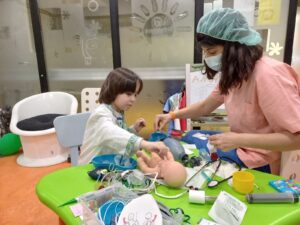“Play promotes trusting relationships between children and their medical providers.”
 At Jo Ann University Hospital, Andria, a five year old with congenital heart disease, immediately enters the playroom “with a smile on his face, looks around to find us all and invites us to play.” The psychosocial care specialists at Jo Ann University Hospital understand how the language of play has made Andria’s medical journey easier. For children, play is not merely an activity or something to do, it is a way to explore the world around them and make sense of who they are.
At Jo Ann University Hospital, Andria, a five year old with congenital heart disease, immediately enters the playroom “with a smile on his face, looks around to find us all and invites us to play.” The psychosocial care specialists at Jo Ann University Hospital understand how the language of play has made Andria’s medical journey easier. For children, play is not merely an activity or something to do, it is a way to explore the world around them and make sense of who they are.
For Andria, donated MAGNA-TILES made an impact. The psychosocial care specialists share, “For almost an hour, Andria was playing and sharing his experience and discoveries. He found out that when he looks in the light with two different colored shapes he can see new colors.”
Play has often been described as the universal language of childhood because regardless of where children live or what language they speak, all children can speak the language of play. As the psychosocial care specialists at Jo Ann University Hospital explain, “Toys are more than just toys in the hospital, it gives children the chance to be distracted from very hard experiences and feel as a child should feel.”
While something as small as a magna-tile may not seem impactful at first glance, the healthcare professionals that Standish Foundation for Children (SF4C) work with around the world understand just how meaningful the impact of a toy donation can be.
Play promotes trusting relationships between children and their medical providers. It fosters a sense of normalcy when life has taken a difficult turn. It allows children to escape into a world of imagination and conquer their fears.
Here at SF4C, we know the power of play and it’s ability to heal. Without your generosity and support, the smiles, exploration, and discovery that happen through play for hospitalized children like Andria, would not be possible.
